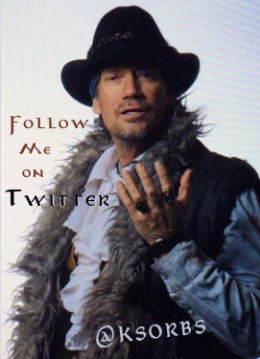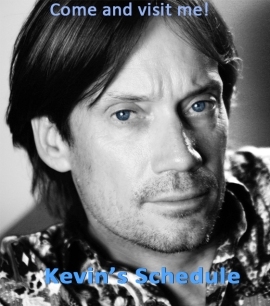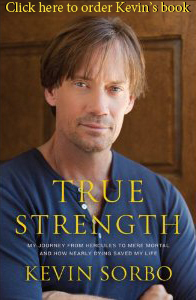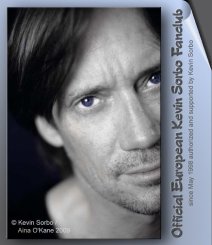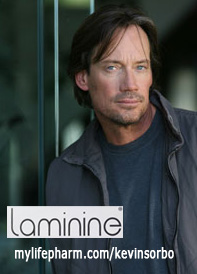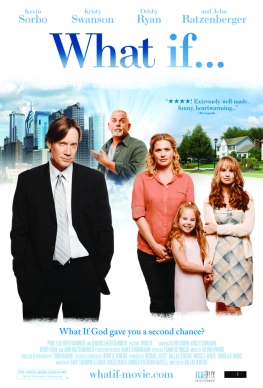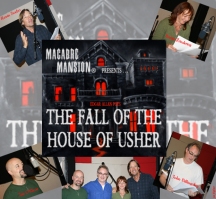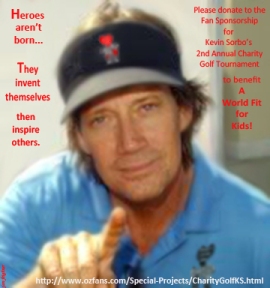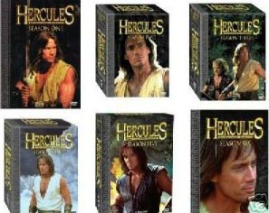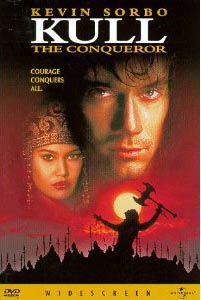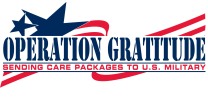Archive
Kevin Sorbo’s inspirational book, True Strength, in paperback October 16
Kevin’s excellent, inspirational book, True Strength: My Journey from Hercules to Mere Mortal—and How Nearly Dying Saved My Life, is available in paperback Tuesday, October 16.
Our good friends at DaCapo Press, Kevin’s publisher, kindly provided this insightful interview with Kevin that outlines his tragic, yet uplifting story.
A Talk with Kevin Sorbo
Author of True Strength
You suffered three strokes at the age of 38. Were there any warning signs that something was wrong? If so, what did you think they could mean?
three strokes at the age of 38. Were there any warning signs that something was wrong? If so, what did you think they could mean?
I had tingling and loss of feeling in my fingers and hand, my fingers turned cold and eventually blue, and I had pain shooting down my arm. It came and went, gradually getting worse as time went by. But I was doing a heavy promotional tour for Kull, the Conqueror at the time they started getting really annoying, so I consulted with doctors at the various hotels—probably five of them over those eight days. There was an explanation that I had hit my funny bone that explained the symptoms, and the doctors also said they thought in any case it probably wasn’t serious. Of course, I didn’t want to believe it was anything, either.
What were your diagnosis and your prognosis?
Initially my diagnosis was cancer, but they didn’t tell me that, thankfully. When they had all the answers that made sense, they diagnosed me with an aneurism in my shoulder that had spewed off so many clots—had clotted off a good portion of my left arm, blockages all the way down. I had also suffered three strokes—they called them mini-strokes, but it turned out they were much more sinister than that. When they finished sending clot-busters into my arm through a tube that went from my groin through my heart to my shoulder, they embollized the aneurism with platinum coils and got me off the Heparin (blood thinner). Then they sent me back to work on a movie I had scheduled in Atlanta.
That didn’t work out too well, because I collapsed on set. That was when the strokes reared their ugly heads. A new neurologist changed my prognosis to questionable and sent me home to only walk an hour a day and do nothing else for five to seven weeks. They simply said there was no way to tell how much improvement I could expect, which was tough because I was really strung out and suffering. They did say the bulk of my recovery would happen within the initial three to six months, and luckily that wasn’t true for me, either.
For how long were you hospitalized?
My first hospitalization was eight days or so. Then I went back to the ER in Atlanta and was admitted for a couple of days.
Why did you decide to turn to alternative medicine, and did you find it to be effective?
I turned to alternative medicine because traditional western medicine just wasn’t doing enough and I actually had trouble with the drugs that were prescribed. A friend suggested one practitioner and my wife found an acupuncturist, and they both turned out to be quite effective.
You played Hercules—an invincible character—yet you were physically incapacitated in real life. How did this irony affect your daily mindset, especially during filming?
I am very thankful that I had the character of Hercules to put on every day on set, even though the first several weeks I didn’t even work more than ten hours per week. I had taken the rest of my hiatus, the time they had set aside for me to shoot my movie, and then they gave me an extra week as well, because I literally could barely stand up straight. I was terribly dizzy and nauseated, had roaring headaches, and my vision was impaired with a big black blind spot that was very disorienting. I certainly couldn’t do fights or any fast movement, for that matter. But that said, Hercules gave a reason to get out of bed. Without that guy, I’m not sure what would have become of me. It was ironic, yes, and everybody on set was in on the joke, but we were all quite dependent on Hercules in a very serious way. The studio and producers were also very invested in the show, and we were all supposed to benefit greatly by getting to the magic 100th episode, so they were more than willing to make whatever adjustments were necessary to allow me to heal as best as I could under the circumstances. It was slow going, though.
How were you able to keep working when your body was so tired and still healing?
I kept going because I was determined not to let the illness win. I would put as much energy as I could on set, and when I got home I’d just collapse. I didn’t give up hope. In a sense I was lucky that I was an anomaly, because the prognosis was wrong from the start, so when they told me three or six months, and then my progress would be halted, I also didn’t believe it. I certainly feared they might be right, but I was determined to prove them wrong!
You married shortly after suffering your strokes. What role has your wife played in your recovery?
She was my rock. She kept me positive and helped me navigate the rough waters. I was lucky to have met her, but now I see God had a plan from the beginning.
You and your wife now have three young children. Did being a father make your recuperation harder or easier?
We had kids after I had substantially recovered. My kids have certainly brought a sense of peace and purpose to my life, and they mitigate any limitations that the illness has imposed on me.
The effects of your strokes lingered for years. When did you start to feel like yourself again, and what role did golf play in that process?
Golf is my therapy. After the strokes, it was pathetic how poorly I played—well, the ball would disappear from my vision if I just turned my head a bit, so it was really challenging and very disappointing. Over time, as I battled back, my golf game slowly returned—the competitive side of me was not affected by the strokes! It took three years for me to feel nearly whole again. I’ll never be what I was, but I like to think I’m improved in ways that I never would be without this ordeal. I certainly know a lot more medical jargon than I ever wanted to!
You mention in the book that if you didn’t keep working, your career would be over. Is there an unspoken rule in Hollywood that you have to hide your illness?
I think that, yes, there is an unspoken rule in Hollywood that reality permeates the film shield. That’s why the box office is affected by a star doing anything in public—and that goes both ways, good and bad. For that reason, the studio didn’t want my illness public. I didn’t, either, but that was more just my pride and the jock in me not wanting anyone to see my weaknesses. I’ve since learned that weakness isn’t a four letter word. It was a good decision at the time, because frankly we didn’t know how the story would end, and I wasn’t into pity parties, anyway, but now that I’ve recovered, I feel like this is the time to share what I’ve learned.
You kept your strokes a secret for many years. Why did you finally decide to speak up about them?
It’s a story of triumph in the end, in spite of the doubts and frustrations, and I realized this story might be able to inspire others to keep fighting as well.
Purchase True Strength in paperback here:
http://www.amazon.com/True-Strength-Journey-Hercules-Mortal/dp/073821602X
(Interview and image courtesy of DaCapo Press)
Blogroll
- 3rd Annual Kevin Sorbo Golf Tournament
- A World Fit for Kids!
- A World Fit for Kids! on Facebook
- A World Fit for Kids! on Twitter
- Hercules Hunt Vids on YouTube
- Hercules Hunt's Blog
- Interview with Kevin at Philadelphia Cultural Events Examiner
- Interview with Kevin in the "Pottstown Mercury"
- Interview with Kevin on "Dr. Blogstein's Radio Happy Hour"
- Interview with Kevin on golferblogger.com
- Interviews with Kevin on "Rex Sikes' Movie Beat"
- Jacqui-D’s Kevin Sorbo page
- Kevin and "Wolf Canyon" on TheCelebrityCafe.com
- Kevin at Ambassador Speakers Bureau and Literary Agency
- Kevin at Creative and Dreams Music Network
- Kevin at Heroes for Hire
- Kevin at Laminine
- Kevin at SpiffBox
- Kevin Discusses WFIT on Vimeo.com
- Kevin on Facebook
- Kevin on IMDb
- Kevin on Twitter
- Kevin on Wikipedia
- Kevin on YouTube
- Kevin Sorbo Annual Charity Golf Tournament Facebook Group
- Kevin Sorbo Czech Fan Site (Czechoslovakian)
- Kevin Sorbo Fans Chatroll
- Kevin Sorbo Official Website
- Kevin's Blog
- Kevin's Flickr Page
- Kevin's Russian Forum
- Kevin's Brazilian Forum, Part of the OIKFSC Family
- Loli's Kevin Collages
- Loli's Kevin Portraits
- Loli's Kevin Vids
- Michidoki Vids on YouTube
- Nyxx's Kevin Blog
- OEKSFC NewsBlog
- Official European Kevin Sorbo Fan Club
- Ryecroft13 Vids on YouTube
- Serratmediterraneo's Kevin Blog (Spanish)
- Sorbo Dreams
- Sorbos-Tribute
- True Strength Book on Facebook
- True Strength Book on Twitter
- True Strength Book Website
Archives
- August 2014
- June 2014
- May 2014
- April 2014
- March 2014
- February 2014
- January 2014
- November 2013
- October 2013
- September 2013
- August 2013
- July 2013
- June 2013
- May 2013
- March 2013
- February 2013
- January 2013
- November 2012
- October 2012
- September 2012
- August 2012
- July 2012
- June 2012
- May 2012
- April 2012
- March 2012
- February 2012
- January 2012
- December 2011
- November 2011
- October 2011
- September 2011
- August 2011
- July 2011
- June 2011
- May 2011
- April 2011
- March 2011
- February 2011
- January 2011
- December 2010
- November 2010
- October 2010
- September 2010
- August 2010
- July 2010
- June 2010
- May 2010
- April 2010
- March 2010
- February 2010
- January 2010
- December 2009
- November 2009
- October 2009
- September 2009
- August 2009
- July 2009

